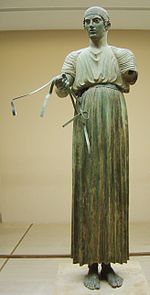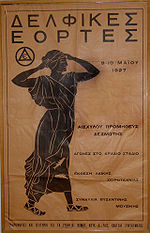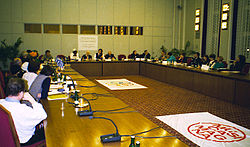- Delphic Games of the modern era
-
The Delphic Games of the modern era involve presentations, exhibitions, competitions and other activities in six different fields of art [1]. These games unite people of all nations and cultures through their fascination for the arts and have their origins in the ancient Greece.
Contents
Historical reference
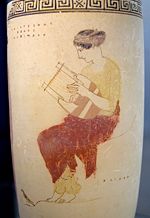 A Muse with Kithara on Mount Mount Helicon, Achilles Painter (at 440-430 BC), State collections of antiquities Munich, Germany
A Muse with Kithara on Mount Mount Helicon, Achilles Painter (at 440-430 BC), State collections of antiquities Munich, Germany
One of the four Panhellenic Games were the Pythian Games in Delphi. They held every four years, always one year prior to the ancient Olympic Games. The spiritual leaders have formed the Delphic Games to perform what they can, such as wonders, theatre, music, poetry to praise the god Apollo of wonderful light, the symbol of the Oracle [2]. In the year 394 A.D., Theodosius I, the emperor of the Byzantine Empire banned all Panhellenic Games for being pagan events.
Since 1912 till 1948, thanks to the initiative of Pierre de Coubertin Art competitions at the Olympic Games were held in various countries. Medals were awarded for works that are related solely to issues of Sport [3].
There was also an attempt to revive Pythian Games at the archeological site of Delphi, thanks to the initiative by the Greek poet Angelos Sikelianos [4] and his wife Eva Palmer. In 1927, the first Delphic Festival was held in one country only - Greece, but the revival was then abandoned due to the excessive costs of organizing it. Nowadays there are once a year in summer in Delphi the Delphic Festivals, mainly focused on tourists. [5].
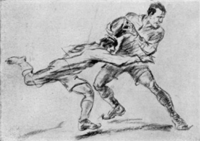 Jean Jacobi from Luxembourg - Gold Medalist for drawing "Rugby". IX Art competitions at the 1928 Summer Olympics in Amsterdam
Jean Jacobi from Luxembourg - Gold Medalist for drawing "Rugby". IX Art competitions at the 1928 Summer Olympics in Amsterdam
Delphic Games of the modern era
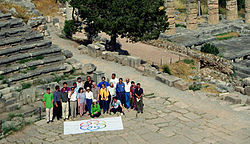 IDC Amphictyony Meeting in Delphi, 1999
IDC Amphictyony Meeting in Delphi, 1999
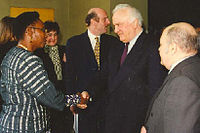 1997 - the first Junior Delphic Games in Tbilisi. First President of the International Delphic Council - Ebun A. Oyagbola welcomes the President of Georgia, Eduard Shevardnadze, the patron of the Games
1997 - the first Junior Delphic Games in Tbilisi. First President of the International Delphic Council - Ebun A. Oyagbola welcomes the President of Georgia, Eduard Shevardnadze, the patron of the Games
In the second half of the 20th century, the International Delphic Movement developed. In 1987 the Musica Magna International (MMI) was founded - as a network of international cultural contacts and as «Association for the reintroduction of the Delphic Games» [6][7][8]. At the invitation of J. Christian B. Kirsch - the founder of MMI, in 1994, a hundred years after the revival of the Olympic Games, representatives from Argentina, Austria, China, Cyprus, Ecuador, France, Germany, Greece, Kazakhstan, Libya, Lithuania, Mexico, Nigeria, Philippines, Poland, Russia, Slovakia, United States came together to the founding congress of the International Delphic Council in Berlin in Schönhausen Palace [9][10]. The Delphic Games of modern era promote the dialogue between all cultures, they contribute to intercultural understanding among people and support the international peace [11][12].
This initiative has received many letters of support from all over the world, for example, from Yehudi Menuhin [13], from Elena Obraztsova[14] and so on [15][16].
National Delphic Council of Georgia (established 1996) together with the IDC conducted the first Junior Delphic Games (Tbilisi-1997) with the support-letter from UNESCO[17] from the Council of Europe[18] from the Parliament of Georgia[19].
The first Delphic Games (Moscow-2000) were organized by the National Delphic Council of Russia, that since 1999 was a member of the IDC [20]. Together with the IDC has NDC Russia received the support-letter from the Council of Europe[21]. So like it was also in other Delphic Games [22][23][24].
IDC and NDC Russia
From the beginning Russia played an active role in the formation of the International Delphic Movement [25].
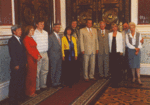 Handing to Mr. Christian Kirsch credentials from ambassador of St. Petersburg. Legislative Assembly of Saint Petersburg (June-2003)
Handing to Mr. Christian Kirsch credentials from ambassador of St. Petersburg. Legislative Assembly of Saint Petersburg (June-2003)
In 2003, the International Delphic Council receives strong support from government agencies in Moscow and St. Petersburg, but the National Delphic Council of Russia (which was a member of the IDC since 1999) on the contrary separates self from IDC.
After 2003, many Russian websites and central mass media claimed that Russia alone has revived the Delphic idea in 2000 [26][27].
Despite the withdrawal of the National Delphic Council from the International Delphic Council, the Russian delegations took part in the International Delphic Games in 2007 and 2009 [28][29][30]. The illustrated Delphic calendars verify these participations [31][32].
Current situation
Currently, the two organizations are conducting Delphic Games.
The International Delphic Council, founded in 1994 in Berlin, with its head office in Berlin, organized and accomplished since 1997 International Youth Delphic Games in Georgia, Germany and the Philippines, as well as International Delphic Games for adult participants - in Russia, Malaysia, South Korea[12][33].
The new organization - International Delphic Committee with headquarters in Moscow opened its official website in May 2006 [34]. Since 2005 the Junior Delphic Games in Russia and the Junior Delphic Games in Commonwealth of Independent States are conducted by the International Delphic Committee. These Junior Delphic Games are dedicated to significant domestic events [35][36]. This International Delphic Committee conducted also in September 2008 the second International Delphic Games in Saratov / Russia, but their legitimacy has been called into question [37][38].
References
- ^ The Delphic Games of the modern era
- ^ Pythian Games, Encyclopedia Britannica
- ^ Richard Stanton. The forgotten Olympic art competitions — The story of the Olympic art competitions of the 20th century. Trafford Publishing, 2001. ISBN 1-55212-606-4
- ^ Aggelos Sikelianos
- ^ Information about the Festivals of Delphi Greece
- ^ Letter from Federico Mayor Zaragoza
- ^ Hans-Georg Torkel. Idee und Geschichte der Delphischen Bewegung // «Innovations Forum», 2/03, page 23. Quotation: Mit der Gründung des Internationalen Delphischen Rates (IDC) im Schloss Schöhausen hat sich Christian Kirsch einen Lebenstraum erfüllt <...> Als Finanz- und Wirtschaftsberater zahlreicher Regierungsinstitutionen und Privatpersonen gründet er im Jahr 1987 die Musica Magna International (MMI) — ein Netzwerk internationaler Kulturkontakte. Später wird die MMI als "Verein zur Wiedereinführung von Delphischen Spielen" registriert.
- ^ Franz Anton. Ein Jahr der Delphischen Spiele. «Sachsen Spiegel», Nr.9, 1. März 1991. Quotation: Kirsch wurde also Präsident der «Musica Magna International», einem Verein, der die Öffentlichkeitsarbeit trägt <...> In diesem Jahr will er das «Internationale Delphische Komitee» gründen, das im Zusammenwirken mit den Nationalen Komitees die Spiele für 1998 in Griechenland vorbereitet.
- ^ Idea and history of the Delphic Movement
- ^ Founding Members
- ^ The Delphic Games of the modern era
- ^ a b Education through Art by Delphic Games of the Modern Era
- ^ Greeting from Yehudi Menuhin 1997
- ^ Greeting from Elena Obraztsova to the III Delphic Games 2009
- ^ Letters from all over the world
- ^ Greeting from the Chairman of the Saint-Petersburg Legislative Assembly to the III Delphic Games 2009
- ^ UNESCO letter 1997
- ^ Council of Europe letter 1997
- ^ Parliament of Georgia letter 1997
- ^ Membership approval
- ^ Council of Europe letter 2000
- ^ Council of Europe letter 2003
- ^ UNESCO letter 2005
- ^ President Republic of Philippines 2007
- ^ L. Wartazarowa.. Delphic Movement - bet on the youth // Greek.ru. — 21 мая 2003
- ^ Oleg Dzüba.. Oblivion and the revival of traditions. // «Парламентская газета» — 24 апреля 2008
- ^ Olga Tanasijtschuk.. Delphian also argue // «Киевский телеграфЪ». — 9—15 октября 2009
- ^ Маrina Chernyavskaya. Delphic Games of the modern era //«Педагогика искусства» Москва, № 2 2008
- ^ Маrina Chernyavskaya. Delphic Games - yesterday, today and tomorrow //«Педагогика искусства» Москва, № 4 2009
- ^ Е. Fedulowa. Delphic Games 2009 // «Личность и Культура», №3— 2010
- ^ Delphic calendar 2009. Delphic Greetings from Baguio City to Jeju
- ^ Delphic calendar 2010. Delphic Games in Jeju. Impressions in drawings
- ^ Lee Kyung-min.Top Artists to Gather at 3rd Jeju Delphic Games September 7th, 2009
- ^ Opening of the website of the International Delphic Committee
- ^ The ninth Junior Delphic Games Russia dedicated to the anniversary of the victory // Вести.ру - 23 апреля 2010
- ^ Welcoming words of the Minister V.L. Mutko
- ^ The newspaper "Vremya" questions the status of the Delphic Games// «Время» Саратов, 22.09.2008
- ^ "Press Menu". Delphic Games: spoon of honey in a barrel of tar // СаратовБизнесКонсалтинг, 29 сентября 2008
External links
See also
Categories:- Cultural festivals
- Arts organizations
- Competitions
- Exhibitions
Wikimedia Foundation. 2010.

